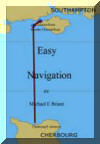|
WATCH KEEPING Everyone works out the system they like best and you have to decide for yourself what you feel about watch keeping at night on Ocean Passages. Close to land - within a few hundred miles of land or main shipping lanes you really do need to keep an eye out but a thousand miles out you are very unlikely to see anything for days even weeks but ..... SINGLE HANDING: I do it by cat-napping day and night. At night its easier - I curl up in the corner of the cockpit, if the weather suits, and set my kitchen timers for say half to three quarters of an hour ( sometimes an hour at dusk or dawn) and sleep. When they go off I wake and have a good look round, run the radar (if I am close to land) to see if there are any echoes, then re-set the timers and go back to sleep. If its lumpy then I go below to the bunk nearest the hatch, pull up the lee cloth and do the same. The disadvantage is that you have to climb up into the cockpit to look round and that wakes you more so its harder to get to sleep. I do much the same during the daytime interspersed by cooking, navigating and sail changes. I always reef for the night so I do not have to run around in the dark, half asleep, reducing sail. I wear my safety harness all the time at night - sleep in it. (not in the day except when it's rough) Frankly I get more rest and feel fitter doing this than with a crew of 1 or 2 helping me watch keep! I know of several single-handlers who just go to sleep at night 2 CREW: I find 4 hours on and 4 off works best for me on long passages - if it is just an overnight or two then possibly 3 on 3 off is better. The trouble with having less than 4 off is that you get so little sleep in your 4 off. I require the watch keeper to call the next person 10 minutes before their watch time - put on the kettle for a tea/coffee/soup. That gives the next person time to dress, go to the loo, and put on their safety harness and be in the cockpit exactly on time to relieve the other person who can't wait to get off watch unless its a particularly beautiful night. When you come off watch you have to fill in the log - just the boats position, barometer reading, wind. No requirement to write a short story! then you get undressed, climb into the bunk and try to sleep - all this takes nearly half an hour and getting to sleep -particularly if its lumpy is not always that easy. Frequently you end up with only 2 to 3 hours sleep before you are on watch again. If you do 3 on 3 off then of course you get less sleep. Around mid-day you both need to be on watch or shorten the watches to 2 hours or 1 hour so that the clock moves round and one person does not get stuck with the lousy 0200-0500 type watch which is most tiring - I think Breakfast is normally taken individually - who ever has the dawn watch makes their own whilst the other sleeps. Cooking lunch and dinner is taken in turns relative to which person is on watch next - I make it a rule that who ever cooks does not have to wash up. It is good to have an agreement as to which maneuvers need two people at night. Obviously one person can put a few turns into or out of a furling genny. If you have most types of in mast reefing then it should be possible for one person to set more sail but maybe reefing needs two if you need to turn up into the wind to achieve it and then leave the cockpit and go to the mast.. As skipper I make it a rule that if anyone wants to reef they call me. (If they want to set more sail they can always do that without asking) When crew want to reef it is normally much later than I would have reefed and I want to know what's happening with the weather) If anyone sees the navigation lights of another ship they call me. If anyone feels concerned about anything they call me. I will never be cross to be called out when I am off watch as it means I can sleep well knowing that I will not be called out to a situation that has already deteriorated. I always wear a safety harness on night watch - even in flat calms and I advise the crew to do the same - if you go overboard, in the dark, whilst you are alone on watch................... 3 CREW: Normally I go for 3 on 3 off which allows around 5 hours sleep per night and the rest can be made up. This is fairly civilised and although the skipper may still get less sleep because of navigation and radio duties it is not too bad. Normally all three crew gather together in the cockpit in the late afternoon for a social hour or two as well as eating dinner together. I try to time dinner so that it's finished and washed up just before sunset and the boat can settle down to the night watch routine - the nice thing is that with a 9 hour cycle the watch periods circulate naturally giving everyone 'good' and 'bad' watches. I still maintain the standing order of calling me for any and all problems. I still put a reef in for the night - an awful lot can change in 8-12 hours 4 CREW: This is very luxurious. I normally go for 3 on 9 off with 2 x 2 hour watches during the mid-day period. Cooking is shared on an equal basis and I think sometimes you need a schedule written down to remind people who is cooking / bread making / watch keeping next. The only trouble with this number of people is that it is very possible to get very bored. There is also the system of overlapping watches at night. You still have 3 hours watch (or switch to 4 hours on) but the person going off watch stays with you for another hour. They then go off and the watch keeper is alone for only either 1 or 2 hours and then calls the next person who keeps the watch-keeper company for their first hour before the original watch-keeper goes off. This system works quite well when the periods of darkness are long. It means there are two people in the cockpit most of the time and it's a pleasant way to pass the night - in day time swop back to single watch keepers. On ocean passages the couple of hours before dusk - after dinner - are an important social occasion in the boat - I run a system that once a week, Sunday night - anyone who has niggles or complaints about me, the system, or other crew or anyone else can air them and they will be discussed by the group. The idea of this is to catch dissention in the bud. Nobody is obliged to speak and it does need to be fairly serious. I never let it become a witch hunt and normally that's no problem as with a weekly platform - in the open things have not normally festered and become issues. I also do this in port. Anyone can say anything - politely - and it will be openly discussed. The other bonding game is to have poetry evenings every 4 days. Everyone has to compose a poem of at least 4 lines. It does not have to rhyme or scan or even make much sense except to the writer. In the cockpit during the social hours each person reads their own creation. The rest of the crew may then comment on it (knowing that they will be reading next and so harsh criticism is a bit a loss leader) Having gone round the critic circle the writer then explains why/how/for whom they wrote the poem. Then the rest of the crew discuss how successful - meaningful the poem is. Then the next person reads out their creation and the same process is gone through. The only way you can fail is not to have written something! Seems to work really well however unlikely it may sound. It's amusing to see off duty crew huddled over a scrap of paper with a pencil beavering away to prepare for the next poetry session. It is also interesting how good some of poems become after 2 or 3 sessions. MORE THAN 4 I really have no experience of this - I suspect it would be the time to have 2 people on night watch together If you are interested in how I find crew then follow this link - Crewing
|









